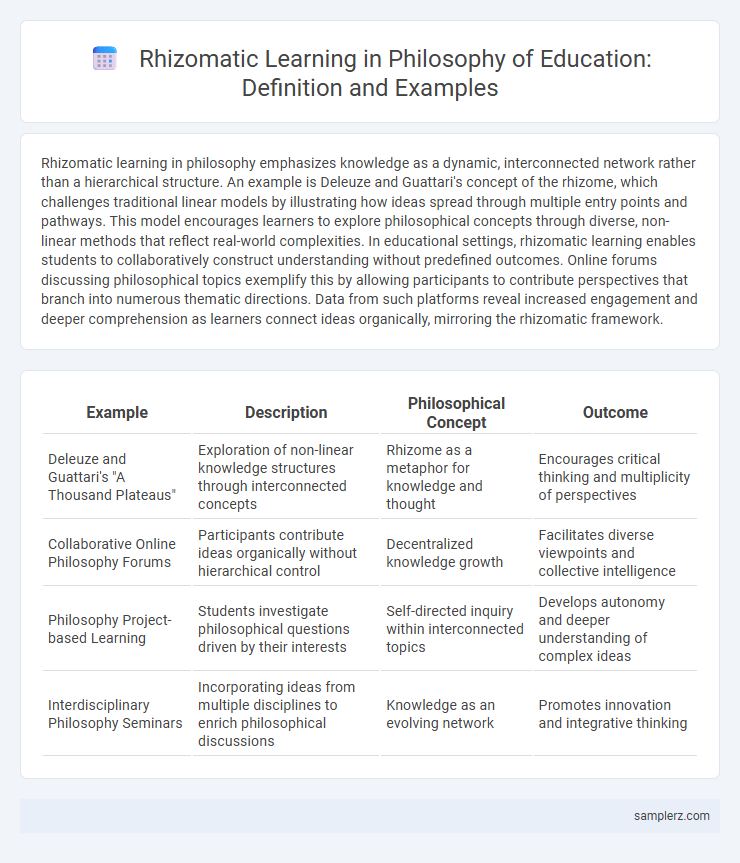Rhizomatic learning in philosophy emphasizes knowledge as a dynamic, interconnected network rather than a hierarchical structure. An example is Deleuze and Guattari's concept of the rhizome, which challenges traditional linear models by illustrating how ideas spread through multiple entry points and pathways. This model encourages learners to explore philosophical concepts through diverse, non-linear methods that reflect real-world complexities. In educational settings, rhizomatic learning enables students to collaboratively construct understanding without predefined outcomes. Online forums discussing philosophical topics exemplify this by allowing participants to contribute perspectives that branch into numerous thematic directions. Data from such platforms reveal increased engagement and deeper comprehension as learners connect ideas organically, mirroring the rhizomatic framework.
Table of Comparison
| Example | Description | Philosophical Concept | Outcome |
|---|---|---|---|
| Deleuze and Guattari's "A Thousand Plateaus" | Exploration of non-linear knowledge structures through interconnected concepts | Rhizome as a metaphor for knowledge and thought | Encourages critical thinking and multiplicity of perspectives |
| Collaborative Online Philosophy Forums | Participants contribute ideas organically without hierarchical control | Decentralized knowledge growth | Facilitates diverse viewpoints and collective intelligence |
| Philosophy Project-based Learning | Students investigate philosophical questions driven by their interests | Self-directed inquiry within interconnected topics | Develops autonomy and deeper understanding of complex ideas |
| Interdisciplinary Philosophy Seminars | Incorporating ideas from multiple disciplines to enrich philosophical discussions | Knowledge as an evolving network | Promotes innovation and integrative thinking |
Exploring Rhizomatic Learning Through Socratic Dialogue
Exploring rhizomatic learning through Socratic dialogue reveals a dynamic, non-linear approach to knowledge construction, where learners collaboratively navigate interconnected ideas without fixed hierarchies. This method encourages critical thinking and continuous questioning, reflecting Deleuze and Guattari's concept of knowledge as a multiplicity of pathways rather than a singular truth. Socratic dialogue exemplifies rhizomatic principles by fostering an open-ended, participatory environment in philosophy education.
Decentralized Knowledge in Ancient Greek Philosophy
Ancient Greek philosophy exemplifies decentralized knowledge through the rhizomatic learning approach, where thinkers like Socrates, Plato, and Aristotle contributed distinct yet interconnected ideas without a hierarchical structure. This method mirrors the rhizome concept by allowing knowledge to spread in multiple directions, fostering collective inquiry and diverse perspectives. Such decentralized discourse encourages learners to traverse philosophical concepts non-linearly, enhancing critical thinking and collaborative understanding.
Collaborative Concept Mapping in Philosophy Classes
Collaborative Concept Mapping in philosophy classes exemplifies rhizomatic learning by enabling students to collectively explore complex ideas such as existentialism, phenomenology, and ethics, creating a non-linear web of interconnected concepts. This method encourages critical thinking and knowledge construction through peer interaction, reflecting the dynamic, decentralized nature of rhizomatic learning theories proposed by Gilles Deleuze and Felix Guattari. Philosophy students benefit from this approach by actively negotiating meaning and deepening their understanding via shared conceptual frameworks.
Applying Deleuze and Guattari’s Rhizome Theory to Ethical Debates
Applying Deleuze and Guattari's rhizome theory to ethical debates fosters a non-linear exploration of moral issues, emphasizing interconnectedness and multiplicity over hierarchical reasoning. This approach encourages students to navigate complex ethical dilemmas by tracing diverse pathways and perspectives, reflecting the rhizomatic structure of knowledge. Such rhizomatic learning in philosophy enhances critical thinking by challenging traditional, binary frameworks and promoting collaborative, networked discussions of ethical concepts.
Philosophy Forums as Networks of Distributed Learning
Philosophy forums exemplify rhizomatic learning by functioning as decentralized networks where participants co-construct knowledge through diverse, interconnected discussions without a fixed hierarchy. These online platforms enable distributed learning by allowing multiple nodes--individual contributors--to interact asynchronously, fostering continuous evolution of philosophical ideas. The dynamic exchange within these forums reflects Deleuze and Guattari's concept of rhizomes, emphasizing multiplicity, non-linearity, and collaborative knowledge production.
Constructivist Inquiry in Philosophy: A Rhizomatic Approach
Constructivist Inquiry in Philosophy, exemplified by rhizomatic learning, encourages students to explore interconnected concepts without fixed pathways, mirroring a non-hierarchical knowledge structure. This approach promotes autonomous meaning-making through dialogic engagement and continuous questioning, reflecting Deleuze and Guattari's rhizome theory. Curriculum designed around rhizomatic inquiry fosters critical thinking by valuing diverse perspectives and iterative knowledge construction.
Peer-Led Discussions: Philosophy Beyond the Syllabus
Peer-led discussions in philosophy exemplify rhizomatic learning by allowing students to explore diverse ideas beyond the standard syllabus, fostering a decentralized and collaborative knowledge environment. These discussions encourage participants to connect philosophical concepts organically, reflecting the non-linear, interconnected structure of rhizomes. This approach enhances critical thinking and enables learners to co-create meaning through shared inquiry and dialogue.
Nonlinear Curriculum Design in Philosophical Education
Rhizomatic learning in philosophical education exemplifies nonlinear curriculum design by allowing students to explore interconnected philosophical concepts without following a predetermined sequence, fostering deeper critical thinking and personalized understanding. This approach mirrors Deleuze and Guattari's idea of knowledge as a map rather than a trace, encouraging learners to navigate diverse philosophical traditions and ideas through self-directed inquiry. Emphasizing adaptive pathways, rhizomatic learning disrupts hierarchical course structures, promoting collaborative meaning-making within dynamic educational environments.
Multiperspectival Exploration of Existentialism
Rhizomatic learning in philosophy exemplifies multiperspectival exploration through the study of existentialism by encouraging students to navigate diverse interpretations from thinkers like Sartre, Camus, and Kierkegaard. This approach fosters nonlinear knowledge construction where learners connect themes of freedom, absurdity, and authenticity across various contexts and cultural backgrounds. Emphasizing collaborative inquiry and open-ended dialogue, rhizomatic learning enables a dynamic and personalized engagement with existentialist concepts.
Student-Driven Philosophical Problem Solving
Rhizomatic learning in philosophy exemplifies student-driven philosophical problem solving by encouraging learners to explore complex ethical dilemmas through interconnected, non-linear inquiry paths. This approach allows students to collaboratively construct knowledge, challenging traditional hierarchical structures and fostering critical thinking skills essential for philosophical discourse. Emphasizing autonomy and adaptability, students engage deeply with diverse perspectives, facilitating a personalized learning journey that mirrors the rhizome's multiplicity and dynamic growth.

example of rhizomatic learning in philosophy Infographic
 samplerz.com
samplerz.com